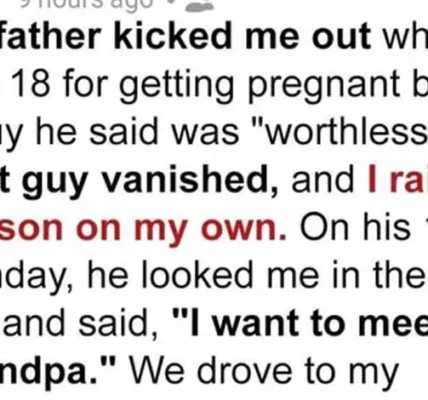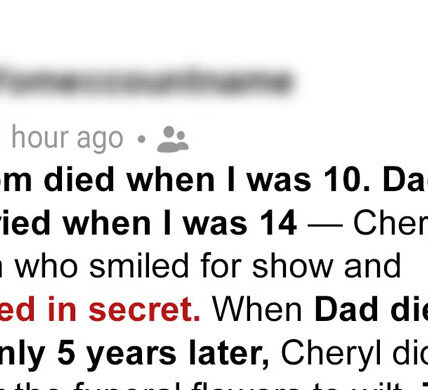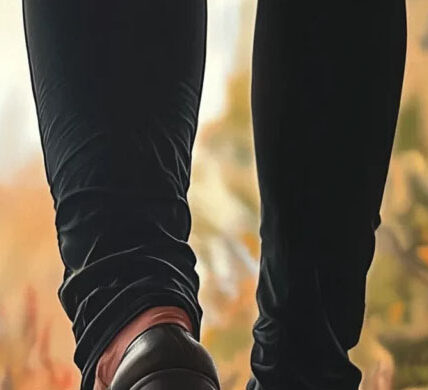He initially just sat in the sand and laughed as the grains trickled like a toy through his prosthetic legs. People gazed, some curiously, some pitying. I prepared myself for the typical inquiries and murmurs.
Then, without a word, he threw them aside, stripped them off completely, and headed directly for the water.
I was terrified that he would struggle. Instead, he jumped in and moved more gracefully and powerfully than I had ever seen.
He was flying over the waves, not just swimming. The lifeguard paused. Others applauded.
He didn’t think of himself as broken, which I should have understood all along, but I stood paralyzed. He considered himself free.
But he was unaware of how severely my concerns had been preventing him from moving forward.
I had overprotected him, wrapped him in a lot of regulations, and made excuses for him for years because I thought I was keeping him safe.
I was left gasping for air as I saw him in the water, feeling as though I had been struck by a wave myself.
People flocked to him when he eventually emerged, glistening with pride and dripping wet.
Some gave him towels, while others gave him champion-like shoulder pats. His eyes met mine, yet he smiled at them all.
I could tell by that glance that he no longer needed my protection. I had to move aside for him.
Back at our little rental cabin by the beach that evening, I couldn’t stop thinking about what had transpired.
He had the energy of someone much older than his age of ten. He hummed to himself as I prepared hot chocolate.
He had his prosthesis leaning on the wall. I questioned him about why he had abruptly thrown them off in that way.
“Because they slow me down in the water,” he explained in between gulps. I also wanted everyone to see that I am capable. I’m not afraid.
I tried to cover up the lump in my throat by nodding. However, I secretly questioned whether I had been the one who had been afraid all along.
Something unexpected occurred the following day. Our cabin was visited by a woman we had seen clapping on the beach.
She identified herself as Carla, a swim instructor in the area. She informed me that the way my son moved in the water was unlike anything she had ever seen.
“Have you ever thought of letting him try competitive swimming?” she inquired. The thought nearly made me giggle.
Swimming competition? For an unlegged boy? However, my kid jumped in before I could graciously decline.
Indeed! I’d like to give it a shot! Mom, please, please! Once more, I froze. All of my instincts told me to say no.
What if he didn’t succeed? What if children made fun of him? What if he was crushed? But then I thought of yesterday.
I recalled his face’s freedom. “All right,” I muttered. “We’ll give it a shot.” And that was the beginning of something I didn’t anticipate.
Carla volunteered to train him at no cost. He had a lot of natural talent, she added, and she believed in that.
Training was challenging at first. He wasn’t accustomed to drills, early mornings, or discipline.
He repeatedly asked me if he could stop, and there were tears and disappointments.
However, each time, he returned to the water and swam a bit more quickly.
When the neighborhood children initially arrived to observe, they were dubious. Some posed cruel questions, while others whispered jokes.
But gradually, the jokes became shouts as the weeks stretched into months. He started to win minor local competitions.
He competed against children with full ability as well as other children with disabilities, and occasionally he prevailed.
My heart was racing each time I watched from the sidelines. What courage looked like was being taught to me by my kid, the boy I used to fear.
However, there was a turnabout that caught me off guard. I heard two parents conversing one evening after practice.
They weren’t content. They believed that my son’s body gave him an edge, thus they thought it was “unfair” for their children to compete against him in a race.
It was unbelievable to me. I was afraid for years that people would think less of him, and suddenly they were saying he was too much.
I had a breakdown that evening. While he slept, I sobbed silently at the kitchen table.
I pondered whether I ought to remove him before the harshness of the outside world destroyed him. But suddenly I became aware of something.
He had taped a piece of paper to the refrigerator. It was a scrawled sketch of him standing on a platform with a gold award in his hand.
He had scribbled, “I can,” on the bottom. I will. It dawned on me then that this was his dream, not mine.
My dread did not give me the authority to take it away. In the spring, the next major meet took place.
Families, coaches, and officials were all crammed in. Some people applauded when my son’s name was called, but others did not.
Standing tall on his crutches, he entered the deck without his prosthetics. Then he threw them aside, like he had done at the shore.
The pistol fired, ready to plunge in. He struck the water. And then there was silence in the whole pool.
He flew instead of merely swimming. Every blow was strong, every spin was precise, and every torso kick propelled him ahead as if he had been destined for this.
By the conclusion, he had smashed the regional record in addition to winning. The audience burst out.
Even his doubting parents were unable to ignore what they had just seen. However, the medal wasn’t the highlight.
He turned to the stands and looked at everyone’s faces until he found mine. He smiled from ear to ear as he held the medal high.
Everything changed after that day. He was requested to speak at schools, appeared in local newspapers, and was invited to larger competitions.
Those who had once felt sorry for him now gazed at him in wonder. But there was still another twist in life.
I received a call months later while he was getting ready for a national meet. His coach, Carla, was in the hospital.
She had passed out in a different group’s training session. She had been fighting cancer in secret for years, it turned out.
We didn’t know. She had devoted all of her remaining energy to mentoring those children and my son. He was heartbroken.
He refused to speak and to train. He sat in his room staring at the wall for days. I had no idea how to get in touch with him.
I finally sat on his bed one evening. “You understand why you were trained by Carla?” I asked quietly.
“Because she recognized the same battle she had in you.” Even when she was ill, she persisted. She also wouldn’t want you to quit right away.
“But what if I lose without her?” he muttered as he gave me a damp gaze. I said, “You’ve already won.”
“You’re proving her right every time you step into that pool.” He returned to training the following morning.
The attendance at the nationals was enormous. Quiet and intent, he stood by the pool. He briefly closed his eyes prior to the whistle.
The race was cruel. Stronger and faster kids are vying for the championship. My son, however, did not falter. There was more to his swimming than strength.
First place was displayed on the scoreboard when he contacted the wall. Cheers erupted across the stadium. Cameras flashed, reporters ran to him, and the award was given to him.
However, he went to the fans, looked up, and stated into the microphone, “This is for Carla,” rather than raising it for himself.



